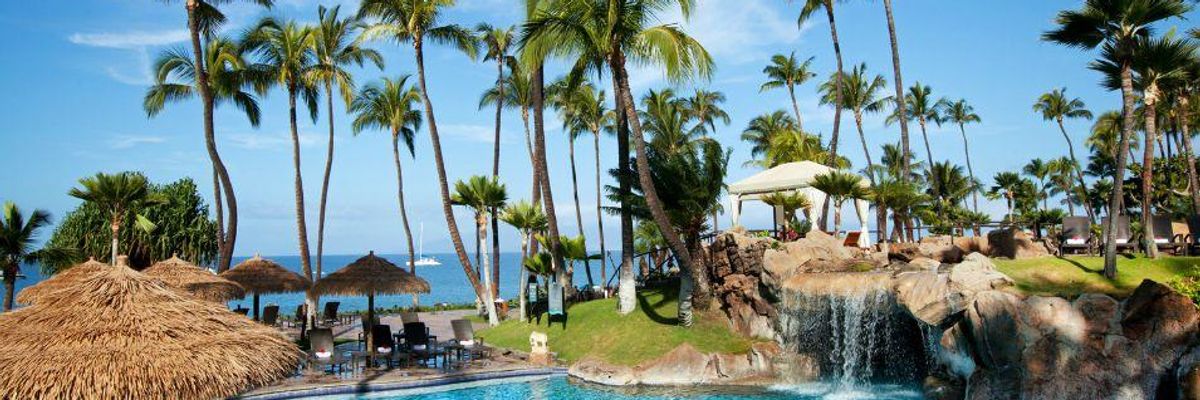As trade ministers gather for negotiations at a luxury resort in Hawai'i on Wednesday to finalize the secretive Trans-Pacific Partnership agreement, hundreds of people are planning to stage protests, hold performances, and raise a sacred "call to attention" to send the message that attempts by the global elite to put "profit over people" are not welcome and will not be tolerated.
"The TPP is a threat to our sovereignty as Native Hawaiians, and as human beings," said Kaleikoa Ka'eo, professor of Hawaiian Studies at the University of Hawai'i, in a press statement. "This secret trade agreement would allow corporations to control decisions about how we live without any accountability to us, the people of this land."
Under the banner "Stop TPP by Land and by Sea," protesters from organizations including Kako'o Haleakala, AiKea, Pacific Alliance to Stop Slavery, Public Citizen, and Sierra Club will gather on the Ka'anapali Beach on the island of Maui to voice their opposition to the deal, which has been broadly criticized by social movements and civil societies across the globe.
In the early evening, the protest will culminate in an attempt to break the global record for the "largest number of conch shell (pu) blown at one time," according to a press statement.
"We chose the pu for this demonstration because in ancient times the sound of the pu was a call to attention; a kahea (call) to recognize something important is about to occur. Today is a call to attention, to join together against this attempt to put profits over people," said organizer Trinette Furtado.
"This event calls attention to all struggles against entitled behavior across the globe. We send this kahea of the pu out past this hotel and the secret TPP negotiations, and out into the ocean, through the mountains, around the world," Furtado continued. "People are awakening, discovering their power. They are hungry to effect a positive change in the world."
Meanwhile, the U.S. government and multinationals are moving rapidly to strengthen their strangleholds on the global economy. The White House is hoping that this week's four-day meeting will clinch a final deal--just a month after President Barack Obama signed controversial Fast Track legislation into law.
The accelerated timeline can be attributed at least in part to the political climate in the United States.
Watchdog group Public Citizen said last week in a statement (pdf) that the White House is "desperate" to announce a final accord: "Unless the Obama administration can not only announce a final [TPP] deal by the start of August, but also by then complete a TPP text and give notice to Congress of intent to sign it, a U.S. congressional vote on TPP almost certainly will be pushed into the politically perilous 2016 presidential election year."
Opponents of the deal say that now is a critical time to mobilize against what they call an unjust and far-reaching corporate giveaway.
The mammoth pact has been negotiated in secret since at least 2008 and includes the U.S. and 11 Pacific Rim countries: Australia, Brunei, Canada, Chile, Japan, Malaysia, Mexico, New Zealand, Peru, Singapore and Vietnam. These countries together represent 40 percent of the world's GDP, making this the largest trade deal yet.
Its many controversial provisions, revealed almost entirely through leaks, include "investor-state dispute settlement" systems (ISDS), popularly known as corporate tribunals, which would create a parallel legal avenue for corporations to sue governments for loss of "expected future profit," with the power to overrule national protections of environmental and human rights.
Analysts and campaigners have also warned the deal poses a threat to workers' rights, protections against human trafficking, and basic privacy.
Humanitarian aid organization Doctors Without Borders declared last week that the TPP is poised to be the "most damaging trade agreement ever for global health." If approved, the accord would "strengthen, lengthen and create new patent and regulatory monopolies for pharmaceutical products that will raise the price of medicines and reduce the availability of price-lowering generic competition," the group warned.
Public Citizen said of the talks in Maui: "Whether or not any real deal is made, a 'breakthrough' likely will be announced. But for whom would it be a breakthrough?"

